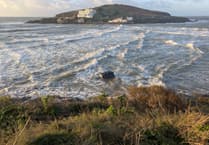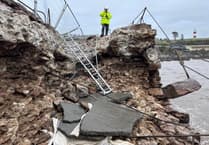Today is World Drowning Prevention Day, prompting a safety reminder from Dart Harbour following a recent spate of marine incidents.
A spokesperson for Dart Harbour Office said: “We’d like to share a few important reminders that aim to keep all users safe, avoid unnecessary call-outs, and prevent easily avoidable risks.”
Don’t end up overboard.
Dart Harbour staff have dealt with several incidents in which people have willingly entered the water to clear fouled propellers or similar problems, believing the task to be simple.
“Each time,” the spokesperson said, “the person has ended up stranded in the water, normally gripping onto mooring lines, and being rescued by sheer chance that our professional staff have been nearby. This is extremely dangerous in a busy, fast-flowing tidal river and must not be attempted.”
Users are reminded that entering the water in the harbour for this purpose is not permitted without a permit from the Harbour Master. The risks from cold water shock, strong currents, limited visibility, and moving vessels are severe.
“It does not take long to lose mobility due to the cold water, making self-rescue impossible,” the spokesperson said.
“If your vessel becomes disabled, contact the harbour office, or if urgent, the Coastguard on 999 or VHF Ch16. There are safer alternatives to entering the water, and Dart Harbour will always strive to assist in these situations.”
Assistance can include towing, repositioning vessels, offering methods of clearing propellers without entering the water, and booking the drying grid as a last resort.
“We know boating often requires quick thinking, but a few minutes of foresight can prevent further trouble—or worse,” the spokesperson added. “If in doubt, please call us or ask for help.”
Handle EPIRBs and PLBs with care.
Dart Harbour has responded to several false distress alerts caused by Emergency Position Indicating Radio Beacons (EPIRBs) and Personal Locator Beacons (PLBs) that were either unregistered or stored incorrectly.
“These devices are vital in real emergencies, but mishandling them can lead to wasted resources and unnecessary alarm,” said the spokesperson.
Harbour users are urged to ensure their beacon is properly registered with up-to-date contact and vessel details and stored securely, as per the manufacturer's guidance. Expired units should be disposed of safely, not left onboard.
“If you accidentally trigger one, inform HM Coastguard immediately to avoid unnecessary search and rescue operations.”
Check before departure
Several mechanical failures have been reported in recent weeks, many of which could have been prevented with basic pre-departure checks.
“Breakdowns not only delay your trip but can also result in minor collisions and emergency call-outs,” the spokesperson said.
Before heading out, boaters are advised to:
- Check they have reliable means of communication, ideally a Marine band VHF tuned to Ch11 or Ch16
- Run engines and inspect cooling systems
- Verify throttle, gear and steering functions
- Have a plan for how to return or get assistance if something goes wrong
- Remember, they have an anchor for a reason
The spokesperson concluded: “Stay safe, plan smart, and let’s look after each other on the water.”





Comments
This article has no comments yet. Be the first to leave a comment.